Queer, Muslim, an immigrant and female: Urooj Arshad has every reason to fear the Trump Administration
But she's not going down without a fight.

“Two days before the election I started having nightmares,” says Urooj Arshad. “Literal nightmares. I’ve never had that before — and I’ve gone through some pretty stressful times in my life.”
Her nightmares were often violent in nature — and very specific. One entailed Arshad being struck for admitting she was Muslim and queer.
“I know how messed up this world is,” says the 41-year-old, who immigrated from Pakistan with her family in the early ’90s. “But I’ve never internalized it subconsciously to the level where I have no control over my dreams. I have a hard time sleeping at night, and I’ve had nightmares that I never had before. I think I’ve really internalized it in a very very somatic level. Like my body has internalized it.
“I am afraid.”
Since President Donald Trump took office, Arshad’s nightmares became reality, as a flood of Executive Orders poured down on the public. The most alarming of these, arguably, is one instituting a travel ban for seven Muslim countries — conveniently omitting those where Trump has business interests. Enacted on Friday, Jan. 27, the ban was immediate, and the chaos it caused — the fear, the resentment, the outrage — is unparalleled in recent history. Those who have argued against it have done so from a Constitutional standpoint. But from a cultural standpoint, it serves to only drive deeper the increased loathing many (not all) of Trump’s supporters harbor toward Muslims in general. The travel ban — which the administration insists is not a ban on Muslims, despite Trump’s repeated, emphatic calling for just that throughout the campaign — has further darkened a constant shroud of dread Muslims living in America huddle under.
Islamophobia is on the rise and the current president, unlike his predecessor, has done nothing to temper the minds of those prone to hatred. With the travel ban, Trump has handed his most bigoted followers a huge stick and not-so-tacitly encouraged them to poke away at their perceived enemies. And mosques are easy and open targets.
For her part, Arshad is worried for the safety of her family, including her 72-year-old mother and her two brothers, one of whom lives in Canada, where a shooter recently opened fire in a Quebec City mosque, leaving six dead.
“I’ve told my mom to not go to the mosque,” she says, a slight yet perceptible tremor in her voice. “I’ve reiterated to my brother to not go to the mosque after the recent Quebec shooting.” And while Arshad herself no longer goes to mosques for religious reasons — she abandoned the tenets of Islam years ago — she notes they also serve as a communal gathering place.
“For [Muslims] living in this country, mosques are cultural centers,” she says. “If there’s an event, you go to the mosque. It’s a safe space. To think that doesn’t exist anymore….”
Arshad works as Associate Director for International Youth Health and Rights at Advocates for Youth, a global policy institute for sexual reproductive health. While it’s not LGBTQ-specific, part of her job is to work with LGBTQ organizations around the globe, requiring her to travel to countries such as her native Pakistan.
When asked if she would venture beyond American borders, the naturalized U.S. citizen says, “Not anytime soon…. I have no doubt that if I leave the country and come back there will be additional questions — and additional targeting.”
Warm, vibrant and thoughtful, with an admitted penchant for “bling,” Arshad also volunteers with the Muslim Alliance for Sexual and Gender Diversity, an organization that sprang out of The Task Force’s 2013 Creating Change Conference, which works to foster support for the LGBTQ Muslim community. Their mission is to “support, empower and connect LGBTQ Muslims. We seek to challenge root causes of oppression, including misogyny and xenophobia. We aim to increase the acceptance of gender and sexual diversity within Muslim communities, and to promote a progressive understanding of Islam that is centered on inclusion, justice, and equality.”
“We have a retreat every year that brings together about one hundred LGBTQ Muslims and partners,” says Arshad, who sits on the group’s 10-person steering committee. “It’s really about making that connection. Our community is very isolated and very traumatized, because they don’t find themselves accepted anywhere. We are really just building an environment where people can just come and be.”
Arshad was deeply heartened that, following the June attacks on Pulse Nightclub, the Muslim community-at-large rallied to support their LGBTQ bretheren.
“It was very interesting, because suddenly there was an opening within the Muslim civic society,” she says. “Organizations said ‘We want to be more public now about supporting you.’ That’s been huge.”
She’s quick to point out that Trump’s travel ban impacts peaceful refugees who are coming to America to escape their own nightmares. “They’re fleeing from extremism, too,” she says. “We’re oriented towards the West — we meaning people who live outside of the West. There’s a way that we’re just fascinated by it. We want to be here.”
Editor’s Note: At the time of this interview, the Trump Administration’s travel ban was in full effect. Things have changed since — somewhat. While a Washington state federal judge has lifted the ban on the grounds of its Constitutionality, the Ninth Circuit Court of Appeals is considering the government’s argument to overturn the decision. Given the chaotic nature of the past several weeks, the ban could be reinstated by the time you read this article.
METRO WEEKLY: You immigrated here from Pakistan when you were 17-years-old. Talk a little about that experience.
UROOJ ARSHAD: My uncle had sponsored us — this was pre-9/11, but even then that kind of sponsorship took a long time. My parents were almost pension age. They had good middle class lives there, and people were really persuading them not to go, because they knew how hard it is to start a life over in America as immigrants. You basically start from the beginning.
I remember my dad had a nice desk job in Pakistan with a petrol company. He had lots of friends. My mom was a teacher. When they came here, their degrees didn’t mean anything. My dad ended up first working in a gas station and cleaning toilets, and then drove a cab until he died. He passed a few years after we immigrated. That was tough. My mom worked in a daycare kitchen until she got repetitive stress injury, and ended up going on disability.
MW: Why did they leave Pakistan?
ARSHAD: Partly they wanted a good life for us. But things were also getting violent in Karachi — a very, very big coastal city where we lived. There was a turf war going on within some political parties that became really violent. I found this out very recently, but apparently my dad had gotten a call, and it was someone threatening “We will kidnap your daughter.” I’m not sure exactly why or where the threat was coming from.
MW: Was he political?
ARSHAD: No, so that was the thing I don’t understand. We were completely an apolitical family. You were encouraged to stay very much apolitical, because being in politics could be really dangerous at that time. He was like “We have to go, we’ve got to go.” He didn’t even tell my mom [about the threat]. I can’t imagine the kind of fear he must have held in his heart. I just remember we moved very fast. Within two months the flat sold, we only could bring what we could in our suitcases, two each. So much of it had to be left behind.
MW: Did you encounter Islamophobia upon arriving here?
ARSHAD: I’m very much reminded of that when I talk to my mom. She has a really tough life here. She has an accent — a heavy accent — and people treat her just horribly. They just assume that because she has an accent she is stupid. It’s really heartbreaking to see your parent go through that. Which is why the current political reality just hits home so much more, because it’s not like things were ever easy. Islamophobia has always been under the surface.
I remember a high school teacher here was like, “Can I call you Paki?” in front of the entire class. Because no one knew how to pronounce my name, and he wouldn’t even make an effort.
MW: How did you respond?
ARSHAD: I just remember everyone laughed, and I laughed, too, because I had just come over. Of course, now if someone said that, they’d never hear the end of it. But then, I just wanted to fit in. I just wanted to be like everyone else.

MW: When did you start to realize you might be gay?
ARSHAD: In Pakistan, I remember having questions about girls and not really knowing what that meant. I went to an all-girls school. Pakistan is very gender segregated, so I was discouraged to have interaction with the opposite gender, anyway. I didn’t have a sexual interaction with anyone then, but I think always being in close proximity with women was really interesting, considering I came out later and realized I had had crushes on some of the girls in my school.
It was later in my teenage years that I started just shutting down. I was not appreciating the way gender roles were being ascribed to me. Even though I didn’t have the language, I knew something was different about me. Even though I’m very fem now — I love my bling — there was a period in Pakistan I stopped wearing any bling. I only wore white. I tried to present, as much as I could, a gender neutral perspective. I remember my friends being like, “Why are you always wearing white?” White is a color of mourning.
MW: How did your family react to your gender neutrality?
ARSHAD: Everybody was supportive. I don’t think they knew what was going on. I hid under the guise of studying.
MW: When did you finally come out?
ARSHAD: I came out first to my brother. I was in college in Illinois. I was 19. I’ve been out to my mother for 20 years. It’s still a struggle in a way. I know she loves me, but there is this way that our familial structures just work differently.
MW: How so?
ARSHAD: It’s about the way you see family. It’s more about your relatives, and your community, and you’re a part of that. You’re not an individual in a way that you are in the West. The priorities are different, which makes it hard to come out as queer, because it’s viewed as you being selfish. You’re not caring about the family. And it’s complicated when you’re living in the West, because then suddenly you’re a minority within a minority kind of situation.
Someone once told me, and this really stuck with me, that when we come out, if we’re lucky we have a lot of community. We have friends. We have loved ones that know us for who we are. Our parents don’t. Especially parents who are not white. My mom’s not going to go to a PFLAG meeting. There’s been some conversations about having Pakistani parents meetup, but they’re so isolated. I have compassion for her now that I didn’t before. But she loves me, she knows who I am. I’ve taken her to London a few times to hang out with my British queer Pakistani friends. She’s totally comfortable and fine.
MW: Explain queer to me as it applies to you.
ARSHAD: The way I see it is that I am attracted to people of different genders. I’ve only had two significant partners, and both have been trans. My current partner identifies as transgender and nonconforming, so they actually don’t identify with either gender. It just allows for a little bit more of a complicatedness around who I’m attracted to and my sense of who I am in the world.
MW: Queer used to be a derogatory term — some still feel it is. It wasn’t acceptable, and yet now it is.
ARSHAD: It’s like the taking back of an identity. I never experienced it being derogatory. I’ve seen it in films. Of course I know the history of it. But I definitely see it from a different perspective.
MW: Tell me about your day job.
ARSHAD: I work at an organization called Advocates for Youth, and we do sexual reproductive health rights work. We do it through a policy program, media, cultural change. We talk about issues like HIV/AIDS, and young people’s access to contraception, and access to safe abortions, all of those things, but it also includes LGBT issues. Most recently I’ve been working on our international side mostly with LGBT organizations outside of the Western world, including Pakistan. So I get to go to Pakistan every year now and work with LGBT activists there, which is pretty amazing.
They’re very supportive of me personally, which I really appreciate. They’ve been checking in with me and making sure I’m safe after the elections, because someone who is out visibly both as Muslim and queer can come with it’s own challenges.
MW: You also work with an LGBTQ organization.
ARSHAD: It’s called the Muslim Alliance for Sexual and Gender Diversity, and we’re a steering committee. It’s all volunteers. At this point, it’s ten of us all over the country who identify as LGBT and Muslim or queer and Muslim. We are committed to supporting our community, and making sure people are getting what they need. For example, we came out with a statement after the Muslim ban, and talked about what that meant for us. We have a retreat every year that brings together about one hundred LGBTQ Muslims and partners. It’s really about making that connection — our community’s very isolated, and very traumatized, because they don’t find themselves accepted anywhere. We are really just building an environment where people can just come and be.
For a lot of people, especially outside of urban areas — but I think even within urban areas — our community members are very stressed, especially these days. For example, we have Hijabi queer women. Imagine having to deal with the multiplicity of what that means. You go to an LGBT space and people don’t know what to do with you. They think you might be super conservative, just because you wear the Hijab, and you’re actually someone who’s queer. Then you go to a Muslim space, and they might not know what to do with you because you are queer. Those spaces where they can be their whole selves are so limited. So that’s one of the huge projects that we do.
We go to conferences like Creating Change and present what it means to be LGBT Muslim. We do Friday prayers. It’s kind of like creating an atmosphere where we are pushing our stories out there. One good example is what happened after Orlando. We were slammed with media. It was ridiculous how many stories we wanted to push out there. We wanted to talk about Islamophobia and homophobia and transphobia. We wanted to say we’re complicated people and Islam is not a monolithic religion. It’s a religion of 1.6 billion people in the world. It’s a very diverse religion. Don’t assume that Islam hates [the LGBTQ community]. We have a complicated relationship to it, but we’re not going to have our stories be used against Islam or against Muslims.
MW: Let’s talk about the administration’s travel ban.
ARSHAD: The Muslim ban is so problematic. My mom is saying don’t go anywhere. I have to travel for work internationally, and I actually don’t know right now if I can — or if should — because I don’t know if I’ll be able to get back. I’m a naturalized citizen, but I’ve been hearing stories about people. One of my friends on the steering committee, their brother was in detention for over 40 hours. He was born in the U.S. I don’t trust the border control. I think they’re just sort of…. It’s just a lot of unknowns right now.
MW: They’ll target any Muslim, basically.
ARSHAD: I think the administration was very smart, because they were like “We’re not doing a Muslim registry,” but they basically are by default doing a Muslim registry, and most likely will add more countries to it.

MW: Are you scared?
ARSHAD: I’m constantly scared. In 2015, there was a 67 percent rise in anti-Muslim bigotry and hate crimes, according to the FBI. I have two brothers. My youngest brother, who I’m close to, drives Lyft in Chicago, and I always am like, oh my god, what if someone gets in the car and starts harassing him for being Muslim? He has such a Muslim name.
Then it’s the bigger things. What happens to the community? People are already so traumatized being LGBT Muslims, and now how much more can we have? How much more can we bear is a constant question.
MW: Obviously certain terrorist actions have created a wider umbrella for bigots to point the blame at the entire Muslim community. A handful of people create, in the name of Islam, a dangerous situation for 1.6 billion innocent people.
ARSHAD: Yeah. Every time there is some attack, we’re like “Please don’t be a Muslim, please don’t be a Muslim.” It hurts to think that an extremist act is equated to everyone else. We are all just painted as one people, and we are all painted as extremists or terrorists. That is not true for white people. The KKK is an extremist group, and not every Christian is asked to be held responsible for their actions. They’re right now in the White House, basically, which is a whole other situation. In America, you’re more likely to be attacked by a white terrorist group than a Muslim group.
MW: What was your response when you learned of the ban?
ARSHAD: I just cried. It was Holocaust Memorial Day, and I was listening to this story on NPR about this woman who had survived. And she was like, “When we were taking the train for six days we didn’t know how bad it would be.” When she got to where she went, her mom was immediately taken away to the gas chamber. She said, “We didn’t even get to say goodbye.” It was just something about that story, and knowing that historically that’s how things happen. She talked about Europe’s complacency, how there were railroad tracks everywhere in Europe, and it was how civil servants, people that you wouldn’t think would be complacent, were. It wasn’t until the 1960s that really people started realizing how horrible it had been.
So I was just bawling, because I partly needed to, because it’s hard to keep going through your day knowing there is so much hatred, and just keep going sometimes. It was basically how before the concentration camps, it was the hatred that got normalized. That, to me, is what’s so scary about this moment: How much hate is being normalized against Muslims and against people who are different, and it’s okay. It’s codified in the highest office in the U.S.
MW: It’s why they’re working so hard to delegitimize the mainstream media. Once hate becomes the absolute norm, there is no recourse to fight it.
ARSHAD: Right. I was reading an article about how to survive an autocracy, and it said believe what [President Trump] says. Believe him first. Some people were like, “Oh, let’s see what happens when he gets in office. Then these EOs have come out like hate, hate, hate, hate, hate. He’s doing exactly what he said he was going to do. Remember how much you’re losing and don’t make that be the normal. I try to remember how much ground we lost last weekend. In just over the weekend when people were detained or deported back, or waited in detention for hours. We lost so much ground last weekend, and it’s continuing.
MW: How do we reclaim that ground?
ARSHAD: I think it’s like all hands on deck. The protests have been inspiring. The acting Attorney General, her few hours of resistance, was so inspiring. It just makes me feel like we still have hope if there is resistance.
MW: What affects you more, someone being anti-LGBTQ or someone being Islamophobic?
ARSHAD: I would say right now always the top of my thinking right now is Islamophobia. Of course anti-LGBT stuff hurts me, too, but on a daily basis I see more ignorance around Islam than I do LGBT people. There has been a huge wave of cultural shift towards LGBT people, but Trump loves pitting the LGBT and Muslim communities against each other.
I always try to see the intersections, but I think on an everyday level what I’m mostly afraid for is my family. That they’re okay, that they don’t get attacked. Those are the everyday things that I think about. Because I’m mostly not around straight people in my life. Mostly it’s all LGBT folks all the time, so I’m like in my little bubble, so the Islam stuff always sits on the top.
MW: There is a common thought in some circles that all Muslims are inherently anti-LGBTQ. Is that your experience?
ARSHAD: Not inherently. That’s what we try to push back on. It depends on who you are. I think that people are thinking through where they’re at. I’ve had a lot of private support, and now there’s more public support. Linda Sarsour, one of the very public faces of Muslim Americans, and one of the coordinators of the Women’s March, always talks about LGBT people as part of what she’s talking about, and I really appreciate that. So no, I wouldn’t say that Muslim’s are anti-gay. I think it’s complicated, but I think especially after Pulse we have a lot of support. We have more and more people thinking about new ways to understand theology.
MW: How did it feel, the day after the inauguration, to see so many people come together for the women’s march?
ARSHAD: I was so glad that there’s a record now of the protests literally trumping his inauguration, and the whole chaos that caused, and the whole “alternative facts” thing that emerged, and how much he went after the media. I just love that that happened, that there was outrage, that millions of women mobilized. That was pretty incredible to see. We need that momentum.
It happened last weekend, too, at the airports. It’s really good to see people being angry, and mobilizing, and plugging into wherever they need to go. I just hope that it continues, because we’re only in week two. This is the thing that I have to remind myself — this is week two out of potentially a four-year administration at least. We need the momentum, for sure.
MW: There was a lot of criticism that the march was comprised primarily of white women. Did you feel represented there despite that criticism?
ARSHAD: So, I didn’t go myself. I didn’t think that it was a space for me, that I needed to be there. I really think that it was a space for white women to be able to express their anger, and to me that was like great — go for it. I have friends who are feeling that way, and they’re really mobilizing. Then I heard analysis by Angela Davis who spoke at the march, as well as she spoke at Busboys And Poets. Alicia Garza, one of the founders of Black Lives Matter, also wrote about it. Their analyses really helped me, and I was like “Okay, you know what? I actually get it, and I think it’s amazing that all of these women turned out.” Yes they’re white women, but they needed to express their anger, and I hope now that they will use that to have a cross-intersectional analysis and will show up for all of the other things that are important, like the Muslim ban.
MW: Do you think we need an LGBTQ march?
ARSHAD: I read that someone is trying to organize one.
MW: It’s actually being organized to occur in conjunction with Capital Pride in June.
ARSHAD: Part of me agrees. I feel like you just keep showing up and keep up the pressure. You want to mobilize. You want to bring people to D.C. As long as they’re doing it intersectionally, as long as they understand the breadth of the experience of LGBT people, including Muslim people, including black folks, including trans women of color who have been dying in this country, and have terrible indicators around life expectancy, economic stuff. As long as it’s integrated, I think people should show up and continue to show up. That’s sort of my first read. I think that depending on who’s organizing, and how they’re seeing it, of course, I might have more of a complicated relationship to it.
MW: Given the times, given the fear, given the stress you clearly feel, there must be happiness somewhere. Where do you find it? What brings you the comfort you need to get through this?
ARSHAD: Me and my partner just moved in, and so we’re creating a home, and that gives me happiness. We painted our walls, and it’s beautiful colors. Pink and like a chartreuse color. Setting up a home with them feels really really amazing. Being around my friends feels really amazing. Talking to my mom. I called her today. I’m trying to hold on to as much of normalcy with my life, and I know how hard it is, but I don’t want to give up the everyday things that bring me joy.
We want to get a dog together. I used to have a Poodle. He died two years ago, and he was such an amazing presence in my life and I miss him so much, but we want to get a dog, and I think that’s going to bring incredible amounts of joy. I’m excited to have that again. I try to think about the small things. Because when I think about the bigger picture, it is very overwhelming. That’s the kind of stuff that I try to remember that brings me joy. Bling. I love jewelry and bling….
The first week after Trump got inaugurated, I wore this big sort of shield-looking thing that I got from Mexico City. I was wearing it as almost like a protection from all of the evilness. I try to do that too, just bring color and bling in my life, and just keep going through my days. I’m very lucky that my work is very supportive, so that helps, too. I think if I worked somewhere where they didn’t see the issues, or they didn’t see me as someone who was struggling, then that would be hard.
I believe this is my life’s work, this kind of intersectional work around LGBT and Muslim issues, so that gets me up in the morning. I feel good that I’m able to see where I can plug in.
For more information on Advocates for Youth, visit advocatesforyouth.org. For more information on MASGD, visit muslimalliance.org.
Support Metro Weekly’s Journalism
These are challenging times for news organizations. And yet it’s crucial we stay active and provide vital resources and information to both our local readers and the world. So won’t you please take a moment and consider supporting Metro Weekly with a membership? For as little as $5 a month, you can help ensure Metro Weekly magazine and MetroWeekly.com remain free, viable resources as we provide the best, most diverse, culturally-resonant LGBTQ coverage in both the D.C. region and around the world. Memberships come with exclusive perks and discounts, your own personal digital delivery of each week’s magazine (and an archive), access to our Member's Lounge when it launches this fall, and exclusive members-only items like Metro Weekly Membership Mugs and Tote Bags! Check out all our membership levels here and please join us today!








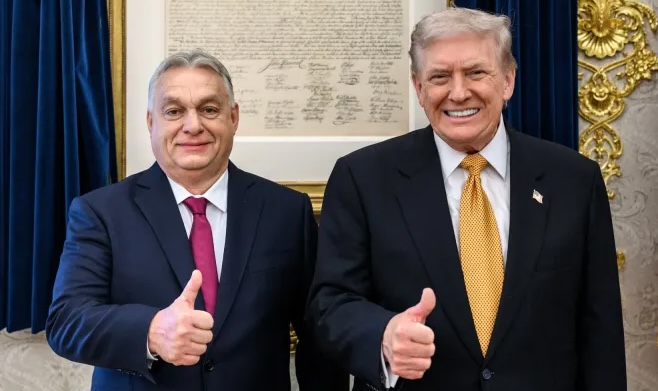
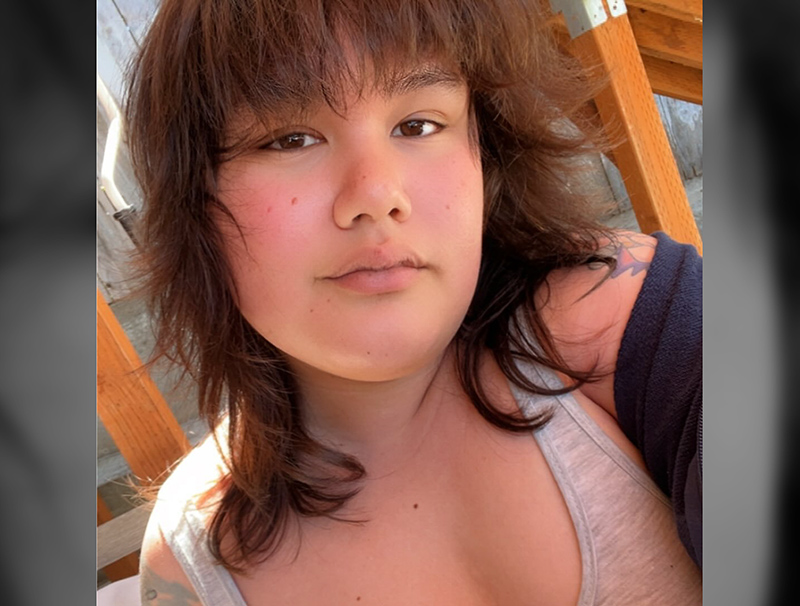















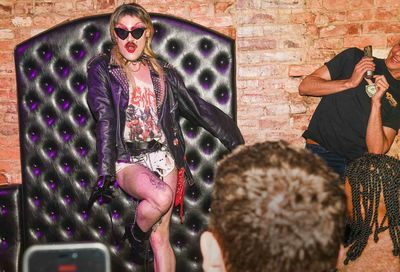
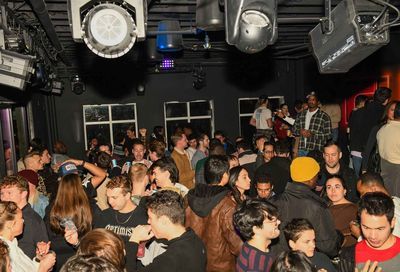
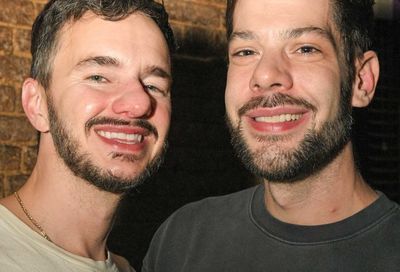
You must be logged in to post a comment.